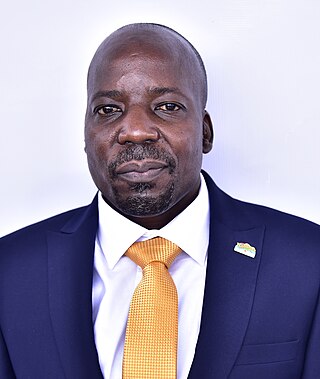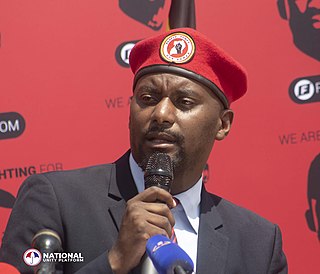Related Research Articles

Uganda, officially the Republic of Uganda, is a landlocked country in East Africa. It is bordered to the east by Kenya, to the north by South Sudan, to the west by the Democratic Republic of the Congo, to the south-west by Rwanda, and to the south by Tanzania. The southern part includes a substantial portion of Lake Victoria, shared with Kenya and Tanzania. Uganda is in the African Great Lakes region, it lies within the Nile basin, and has a varied equatorial climate. As of 2024, it had a population of around 49 million, of which 8.5 million live in the capital and largest city, Kampala.

The politics of Uganda occurs in an authoritarian context. Since assuming office in 1986 at the end of the Ugandan civil war, Yoweri Museveni has ruled Uganda as an autocrat. Political parties were banned from 1986 to 2006 in the wake of the 2005 Ugandan multi-party referendum which was won by pro-democracy forces. Since 2006, Museveni has used legal means, patronage, and violence to maintain power.

Yoweri Kaguta Museveni Tibuhaburwa is a Ugandan politician and military officer who is the ninth and current president of Uganda since 1986. His government is considered autocratic.

The National Resistance Movement has been the ruling party in Uganda since 1986.

Sam Kahamba Kutesa is a Ugandan politician, businessman and lawyer involved in several corruption cases. By the marriage of his daughter Charlotte Kutesa Muhoozi with Muhoozi he is part of the inner circle of president Museveni. Kutesa was the Minister of Foreign Affairs in the Cabinet of Uganda, a position he held from 13 January 2005 and maintained through three cabinet reshuffles until May 2021. He was also the elected Member of Parliament (MP) for Mawogola County in Sembabule District. He was the President of the United Nations General Assembly during its 69th session in 2014–2015.

The Uganda People's Congress is a political party in Uganda.

Human rights in Uganda have trended for the past decades towards increasing harassment of the opposition, cracking down on NGOs which work on election and term limits, corruption, land rights, environmental issues, womens, children and gay rights. In 2012, the Relief Web sponsored Humanitarian Profile – 2012 said Uganda made considerable developments Since at least 2013 the Freedom in the World report by Freedom House has identified Uganda as a country considered to be "Not Free".There are several areas of concern when it comes to human rights in Uganda, and the "Not Free" classification is due to both low political rights and civil liberties rankings.
Joe Oloka-Onyango is a Ugandan lawyer and academic. He is a Professor of Law at Makerere University School of Law where he has also formerly been Dean and Director of the Human Rights and Peace Centre (HURIPEC). He is married to Prof Sylvia Tamale, also a lawyer, academic and activist. They have two sons; Kwame Sobukwe Ayepa and Samora Okech Sanga.

Norbert Mao is a Ugandan political activist and lawyer. He has been president of the Democratic Party since 2010, three time presidential candidate and served as the Local Council 5 chairman for Gulu District. He is the current minister for Justice and Constitutional Affairs in the Ugandan government, an office he assumed on 21 July 2022. He was appointed to this position by Yoweri Museveni, the president of the Republic of Uganda. The appointment drew immense criticism from the Democratic Party, an opposition party he is currently serving as president. It was seen as a move by President Museveni to tame the Party and clip its wings to criticize his government.

Lesbian, gay, bisexual, and transgender (LGBT) people in Uganda face legal challenges not experienced by non-LGBT residents. Same-sex sexual activity is illegal for both men and women in Uganda. It was originally criminalised by British colonial laws introduced when Uganda became a British protectorate, and these laws have been retained since the country gained its independence.
Benjamin Josses Odoki is a former Chief Justice of Uganda, former Supreme Court Justice of Eswatini, and current Chairman of the Committee of Constitutional Experts for Drafting the EAC Political Federation Constitution, the committee drafting the constitution for the East African Confederation. Odoki served as the tenth Chief Justice of Uganda from 2001 to 2013 after fifteen years as a Judge on the Supreme Court of Uganda. He was a State Attorney of Uganda previous to his appointment to the court in 1986.
Esther Mayambala Kisaakye is a Ugandan judge. She is a Justice of the Supreme Court of Uganda. She was appointed to that position in July 2009.

The Anti-Homosexuality Act, 2014 was an act passed by the Parliament of Uganda on 20 December 2013, which prohibited sexual relations between persons of the same sex. The act was previously called the "Kill the Gays bill" in the western mainstream media due to death penalty clauses proposed in the original version, but the penalty was later amended to life imprisonment. The bill was signed into law by the President of Uganda Yoweri Museveni on 24 February 2014. On 1 August 2014, however, the Constitutional Court of Uganda ruled the act invalid on procedural grounds.

The Entebbe–Kampala Expressway, also known as the "Kampala–Entebbe Expressway" or the "Entebbe–Kampala Highway", is a four-lane toll highway in the Central Region of Uganda. The highway links Entebbe International Airport, the country's largest civilian and military airport, to Kampala, the country's capital and largest metropolitan area. Originally, the highway was planned for commissioning in 2016, but because of the delayed works, commissioning was done on 15 June 2018 by Uganda's sitting president, Yoweri Museveni. Recently, the Uganda Minister for Works and Transport, Gen. Katumba Wamala launched the toll point at Kajjansi along Kampala–Entebbe Road.
Uganda has a very long and, quite permissive, and sometimes violent history regarding the LGBT community, stretching back from the pre-colonial period, through British colonial control, and even after independence.
Lillian Tibatemwa-Ekirikubinza is a Ugandan lawyer, academic and judge, who has served as a Justice of the Supreme Court of Uganda, since 2015.

Fox Odoi-Oywelowo is a Ugandan advocate and legislator. Odoi-Oywelowo is a former senior legal counsel to the president of Uganda Yoweri Museveni.

The Sexual Offences Bill, 2019 was a bill in Uganda that consolidated a number of previous laws regarding sexual offences, introduced some provisions toward addressing sexual violence, and criminalised same-sex relationships. The bill was passed by the Parliament of Uganda on 5 May 2021, but was vetoed by President Yoweri Museveni on 18 August 2021.
Capital punishment is a legal penalty in Uganda. The death penalty was likely last carried out in 1999, although some sources say the last execution in Uganda took place in 2005. Regardless, Uganda is interchangeably considered a retentionist state with regard to capital punishment, due to absence of "an established practice or policy against carrying out executions," as well as a de facto abolitionist state due to the lack of any executions for over one decade.

David Lewis Rubongoya is a Ugandan lawyer, politician and University lecturer who played a key role in the founding of the National Unity Platform (NUP) political party, alongside its president Bobi Wine. He currently serves as the NUP's inaugural Secretary General since 2020. He was also part of the People Power monement as an ally of Bobi Wine.
References
- ↑ African Books Collective. "George W. Kanyeihamba". African Books Collective. Retrieved 29 May 2021.
- ↑ Oloka-Onyango, Joseph (2017). When courts do politics: public interest law and litigation in East Africa. Newcastle, England: Cambridge Scholars Publishing. p. 281. ISBN 9781443864091.
- 1 2 3 Kanyeihamba, George W (2012). The Blessings and Joy of Being Who You Are. Kisubi Entebbe: Marianum Press. p. 30. ISBN 9789970907502.
- ↑ University of Warwick. "Honorary degrees for experts on Heart, DNA, Shakespeare, & Holocaust aftermath". University of Warwick. Retrieved 25 May 2021.
- ↑ Nganda, Ibrahim Ssemujju (26 July 2009). "Why I ruled to overturn Museveni 3rd term - Kanyeihamba". The Observer. Retrieved 25 May 2021.
- ↑ Lyons, Scott (19 September 2006). "The African Court on Human and People's Rights". ASIL Insights. 10 (24).
- ↑ "Uganda's government accused of blocking the re-election of judge to African court". VOA. 27 October 2009. Retrieved 25 May 2021.
- ↑ Ugandan Judges: George W. Kanyeihamba, Anup Singh Choudry, Laeticia Kikonyogo, Martin Stephen Egonda-Ntende, Benjamin Joseph Odoki. Books LLC. 29 May 2010. ISBN 9781157289791 . Retrieved 25 May 2021.
- ↑ Kanyeihamba The Incredible: His Life, Work, Love for Human Rights, Rule of Law and Constitutionalism in Prose and Photographs. Entebbe Uganda: MicarPrint. 2020. p. 1. ISBN 9789970907533.
- 1 2 Kanyeihamba, George William (2021). Kanyeihamba: The Women I Have Loved. Kampala: MICARPRINT. pp. 15–17. ISBN 9789913994156.
- 1 2 Kanyeihamba, George W. (2012). The blessings and joy of being who you are. Kisubi, Entebbe, Uganda: Marianum Press Ltd. p. 405. ISBN 9789970907502.
- ↑ The Aga Khan University. "Address by Chief Guest Honourable Justice Professor Dr G.W. Kanyeihamba". The Aga Khan University. Retrieved 25 May 2021.
- ↑ Kagumire, Rosebell (7 November 2005). "Details of Kanyeihamba's resignation emerge". Uganda Radio Network. Uganda Radio Network. Retrieved 25 May 2021.
- ↑ "Justice George W. Kanyeihamba – Uganda". African Court on Human and Peoples’ Rights. Retrieved 25 May 2021.
- ↑ "Report of the advisory panel of eminent Commonwealth judicial experts". Commonwealth Legal Information Institute. Retrieved 25 May 2021.
- ↑ Katende, J. W.; Kanyeihamba, George W. (January 1973). "Legalism and Politics in East Africa: The Dilemma of the Court of Appeal for East Africa". Transition. 43 (43): 43–54. doi:10.2307/2935148. JSTOR 2935148 . Retrieved 29 May 2021.
- ↑ Researchgate. "Urban planning law in East Africa With special reference to Uganda". Researchgate. Retrieved 29 May 2021.
- ↑ Researchgate. "Law in urban planning and development in East Africa". Researchgate. University of Warwick. Retrieved 29 May 2021.
- ↑ Kanyeihamba, George W (December 1974). "Urban planning law in East Africa: with special reference to Uganda". Progress in Planning. 2: 1. doi:10.1016/0305-9006(74)90005-1 . Retrieved 29 May 2021.
- ↑ Renton, Bruce (1977). "Book reviews and notes". The Law Teacher. 11 (1): 62. doi:10.1080/03069400.1977.9992467 . Retrieved 29 May 2021.
- ↑ Researchgate. "Improving the Standards of Human Rights and Refugee Protection in Africa". Researchgate. Refuge: Canada's Journal on Refugees. Retrieved 29 May 2021.
- ↑ Kanyeihamba, G. W. (June 1980). "The impact of the received law on planning and development in anglophonic Africa". International Journal of Urban and Regional Research. 4 (2): 239. doi:10.1111/j.1468-2427.1980.tb00362.x . Retrieved 29 May 2021.
- ↑ Kanyeihamba, George W. (1975). Constitutional Law and Government in Uganda: The Theory and Practice of Constitutionalism in Uganda Including the Government and Local Administrations, the Citizen and the State, Administrative Law, the East African Community, and the Commonwealth. National Library of Australia: East African Literature Bureau. Retrieved 29 May 2021.
- ↑ Kanyeihamba, George W. (1 April 1998). Reflections on the Muslim Leadership Question in Uganda. Amazon: Fountain Pub Ltd. ISBN 9970021508.
- ↑ Project Muse (29 December 2006). Kanyeihamba's Commentaries on Law, Politics and Governance. Law Africa. ISBN 9789966031884 . Retrieved 29 May 2021– via Project Muse.
- ↑ Kanyeihamba, George W. (2010). Constitutional and Political History of Uganda: From 1894 to Present. Law Africa. ISBN 9789966031501 . Retrieved 29 May 2021.
- ↑ Archbishop Kiwanuka Memorial Library. "The blessings and joy of being who you are". Archbishop Kiwanuka Memorial Library. Retrieved 29 May 2021.